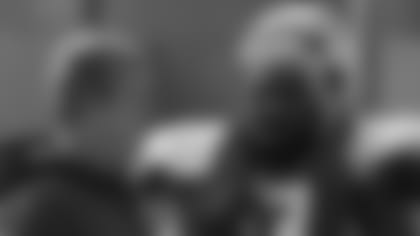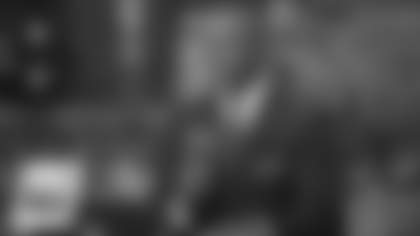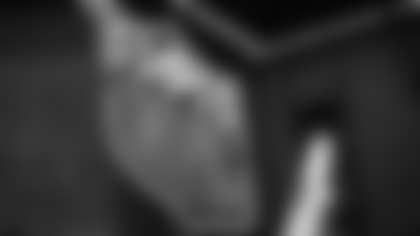Linebacker Harry Carson, a 2006 Pro Football Hall of Fame inductee, played his entire career for the Giants from 1976-88. A nine-time Pro Bowler, Carson met Parcells when the coach was hired as the Giants' defensive coordinator in 1981. Parcells was the head coach for the last six years of Carson's career. Carson was a team leader and the sole captain of 1986 Super Bowl XXI championship team. When Parcells wanted a message communicated to the players, or a problem fixed in the locker room, he turned to Carson and fellow veteran George Martin.
"Bill was my coach before he became the head coach, so I know him on a different level. I saw him take what he was given and he molded it to what he wanted it to be. I use myself as an example. I was a pretty good linebacker that he inherited. Bill saw that he could make me better by getting back to fundamentals. He sort of humbled me and broke me down and then he built me back up to where he wanted me to be.
"I knew what my responsibilities were. We went from a 4-3 to a 3-4 defense. He was able to fashion a defense in his own image, first with Brad (Van Pelt), Brian (Kelley), myself and Lawrence (Taylor) and then with Gary (Reasons) and Carl Banks and myself and Lawrence. He wanted a particular kind of defense and guys who can play defense.

| RELATED NEWS |
| Exploring Bill Parcells' legacy An in-depth look at the career of the Hall of Fame coach... Giants in the Hall of Fame [  PHOTOS: Bill Parcells' Career](http://www.giants.com/photos/photos/Bill-Parcells-Class-of-2013/fcbc5e22-3511-4747-9433-945a98d0869f) |
"The one thing I've always said about Bill was he knew his stuff and he made it a point to stay plugged into every player on a weekly basis. There were some guys that he would chew out and they took it because that's what they needed. But then there were other guys who he knew needed that pat on the rear end. He gave them words of encouragement and that worked. And so he was not just a good coach, but he was a great evaluator of talent and he knew how to motivate different players. When you have all of those players and all of those different personalities, you have to know exactly what buttons to push and he was the master manipulator.
"Those are the things that made him the coach that he became. Not just the X's and O's and the wins and the losses and building programs and all of that stuff. Bill understood personalities, he understood players and he knew when to put the pedal down. He didn't always know when to let up. I think the reason he kept the older guys like myself and George around was we had to sometimes be that voice of reason, not only in the locker room, but also be that balance between the head coach and the players. He had a good mix of older guys and younger guys and I think that players respected him as a coach and I think that players on other teams wanted to play for him. He was that kind of guy.
"Ottis (Anderson, acquired is midseason trade in 1986) is a prime example. He always admired Ottis as a back and when he got the opportunity to get Ottis, he got him. He brought Ottis in and he broke Ottis down to where he wanted him to be. Ottis knew that it was Joe Morris' running attack and Ottis sat patiently until it was his turn. When Bill went to the Jets and Keyshawn Johnson was drafted I met Keyshawn and told him, 'If you want to win, then you'll win with Bill Parcells. If you just want to play and you want to try to get as much money as you can, that might not be the place for you.' I told him, 'If you're serious about winning, it isn't going to be pleasant. He's going to drive you and he's going to dog you out, but if you want to win and if you're one of those players that can take it, then Bill is the guy that you want to hitch your wagon behind.'"
"Bill would often come to George and me. He'd say, 'This guy has a lot of potential, but he has to keep his head out of his (butt) and that's something I want you to take on. If you don't do it, I'm going to hold you personally responsible.' That was it. 'I'm going to hold you personally responsible.' I'm like, 'Why are you bothering me? I have my own stuff to deal with.' So he would challenge the older guys and he relied on the older guys to be leaders and to manage the locker room and manage the guys who were maybe having some issues. And so we had to become basically mentors and like big brothers for those guys and for what was going on in the locker room. There was a sense of discipline in the locker room and the younger guys knew that the older guys would not tolerate certain behavior.
"Part of that was also Wellington Mara, because if you played for the Giants you understood it's a different organization and you didn't want to anger Mr. Mara. He would never really say anything, but you could tell, you could read him. Part of it was we had that relationship with Mr. Mara where he would be at practice every day and he would be there to oversee everything. I know that Bill and Mr. Mara would talk, but also those older guys knew where things stood with regard to Mr. Mara and then with Bill.
"I remember being in the locker room after we lost to the Bears (in the 1985 playoffs). Bill challenged the older guys. He said, 'This might not happen again. You might not have this opportunity again and so it's incumbent upon you older guys to get everybody ready.' He said this will not happen again in terms of the way that we played on that day against Chicago. But I specifically remember him challenging the older guys and when I came back to minicamp in May it was an altogether different feel to the team, because it was all about business. We had fun, but guys were more serious and guys were ready. They were strong. They had been lifting during the offseason and they were focused.
"I'm very happy Bill made the Hall of Fame this year, because he's been on that list a couple of times and I certainly didn't want him to become like Harry Carson who at some point was like the Susan Lucci of the Hall of Fame. Last year, I contacted him and I wished him good luck because he was a finalist and he said, 'I'm not holding my breath,' because I think he knew some of the stuff that was coming out of that room (where the selection committee meets). Some of those guys had a problem with Parcells coming in, taking a job and then leaving before the job was finished. If you're down in Dallas, you get ticked off. They will say he left before the job was done and so that reporter may not vote for Parcells. It's just one of these things that he's a restless kind of guy. I certainly understand that. He likes challenges.
"The one thing that he really loves is the locker room. That's his passion. That really is his lifeblood, just to be around the players and be in the locker room with them. That's his X-factor. He's not one of those guys who is sequestered in his office. He loves being in the locker room. He loves being with the players.
"When it was announced that he had been selected I called him and he didn't answer. I said, 'Bill, I am not going to leave you a message like you left me.' Because the message that he left me when I was elected, I still have it on my cell phone, and I have not erased it. I said, 'I want to congratulate you personally' and so about eight o'clock that night he called me and we talked about it."
Carson then played the voice mail he received from Parcells when he was elected to the Hall of Fame in 2006.
"Harry, I wanted to tell you how happy I am for your selection and how grateful I am to some of those people who really worked hard to help you and I just can't tell you how deserving…and I am just elated. Actually, it made me cry. I just wanted to tell you that I'm thinking about you and I know you…I'm just so happy for you and wanted you to know that I just think you're very deserving. I look forward to the day when I see you up there being enshrined in the football Hall of Fame. It's just a wonderful honor. I just can't tell you how happy I am for you."
Carson: "It's a very exclusive club and Bill is very deserving to be there. I think that he and John Madden will probably get along quite well. It's one thing to be a Hall of Famer and it's another thing to be a Hall of Fame coach, because those guys are pretty special. You have Don Shula, John Madden, Joe Gibbs. It's really great to see those guys come back and be a part of the Hall of Fame festivities. They're held in such high regard and I think Parcells will be the same way. He'll be held in very high regard by many of those older players, but also many of the more contemporary players who he coached against."





